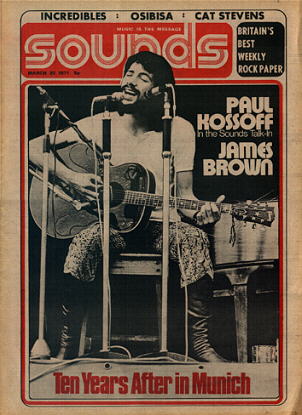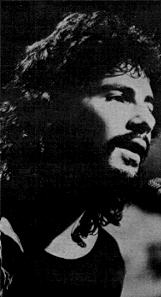Sounds Magazine
March 20, 1971
Written by Penny Valentine
Contemporary Songwriters

CAT STEVENS is very rare amongst the British writer syndrome in
that a vast percentage of his work stems from his environment. He is a self-confessed
environmental writer, the mainstay of his work being a total product of one fact —
that for more than 20 years Stevens was born, lived and brought up in the heart of London.
Just as Nyro’s work is
over-painted with urban neurosis, so Stevens is often dedicated to the hustle of’
city life. The fact that in temperament his music doesn’t come out quite as exposed
and vulnerable as Nyro’s is, I suspect, more of a clever ruse than anything else
— the fact that his arrangements are such pure icy pieces of perfection they tend to
hold the violence and anger in check.
It is worth noting exactly
what sort of effect being a child in a concrete and diesel-fumed society has — the
small things that many children come to expect as being an ordinary part of there lives
evaded Stevens and many like him. His playground was the one he had to make in his own
imagination amongst the dark doorways and the neon lights. Being a child in London means
you don’t know what real darkness is unless you shut your eyes real tight, you never
steal apples and you’ve never smelled cornfields on a hazy day.
The effect of this up
bringing was noticeable from the first songs Cat Stevens wrote. One of his earliest
numbers was "Matthew And Son" a song Stevens wrote based on the experiences of a
friend who worked in a London firm that regimented its employers and the ghastly hum-drum
existence they led.
This theme re-occurred
recently on a track from "Tea For The Tillerman" an album which although some
tracks signaled a different attitude from Stevens still kept the essence of his worries
and dreams. The track was "But I Might Die Tonight":.
- "I don’t want to work Away
- doing just what they all say
- ‘Work hard boy and you’ll find
- one day you’ll a have a job like
mine’"
His childhood problems,
that had ingrained themselves in Stevens’ attitude and consequently his songs came
most strongly to the fore on another track from that album "Where Do The Children
Play". A cry of protest not just from someone who was worried about environmental
pressures but from someone who knew what that kind of life could do.
- "Well I think it’s fine
building Jumbo planes,
- or taking a ride on a cosmic train,
- switch on summer from a slot machine,
- Well you’ve cracked the sky,
scrapers fill the air,
- but will you keep on building higher
- ‘till there’s no more room up
there
- I know we’ve come a long way
- we’re changing day by day
- but tell me, where do the children
play?"
-
Stevens is, naturally also
a very personalized writer he uses repetition a great deal to bring home the futile slog
of most people’s existence in a city, but when he’s not hung up about the
environment he appears to hold a very pessimistic attitude both to human nature and
particularly to his love affairs.
This started a long way back
and came out originally on ‘I Love My Dog an overtly brilliant little track which
tended to cover slightly that very early bitterness:
- "I love my dog as much as I love
you.

- I know that my dog will always be
true’
In other words that the
lady might not be. "Lady D’Arbanville" the first track on a highly
auto-biographical "Mona Bone Jakon" album, showed his suffering and defeat in
the face of the death of an affair. In typical Stevens style he almost reversed this
— finding some comfort in reflecting this end against D’Arbanvilie’s death
as Hamlet might have Ophella.
Because of his very sudden
and traumatic brush with death its something that often crops up in his songs. His fight
against TB is pinpointed on "Mona" — as indeed is his bitter little send up
of his early life in rock "I’m Gonna Be A Pop Star" — and the subject
of his own death, In less obvious terms is included on "Miles From Nowhere"
where he mentions that al- though his body has served him well on the climb through life,
when he gets to the end he won’t need it anymore.
Despite an output of really
fine material in the past two years I suspect Stevens most intriguing and reflective song
about his upbringing has been ‘into White’. His dream of icy calm — a
vision that contrasts sharply with the place that formed, initially, his character. A
chance for peace. Clean, sharp and bright his senses alert and not deadened by the noise
of trucks and cars trundling past his parent’s restaurant. Everyone has their own
dreams, Stevens is a place of delicacy and soft brilliance:
- "I build my house from barely rice,
- green paper walls and water ice,
- tables of paper wood, windows of light
- and everything emptying into
white."
Top
of Page |